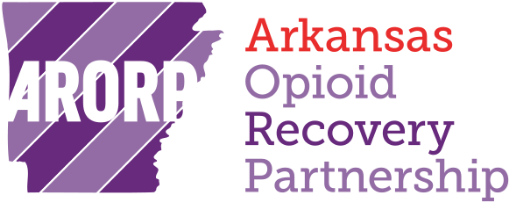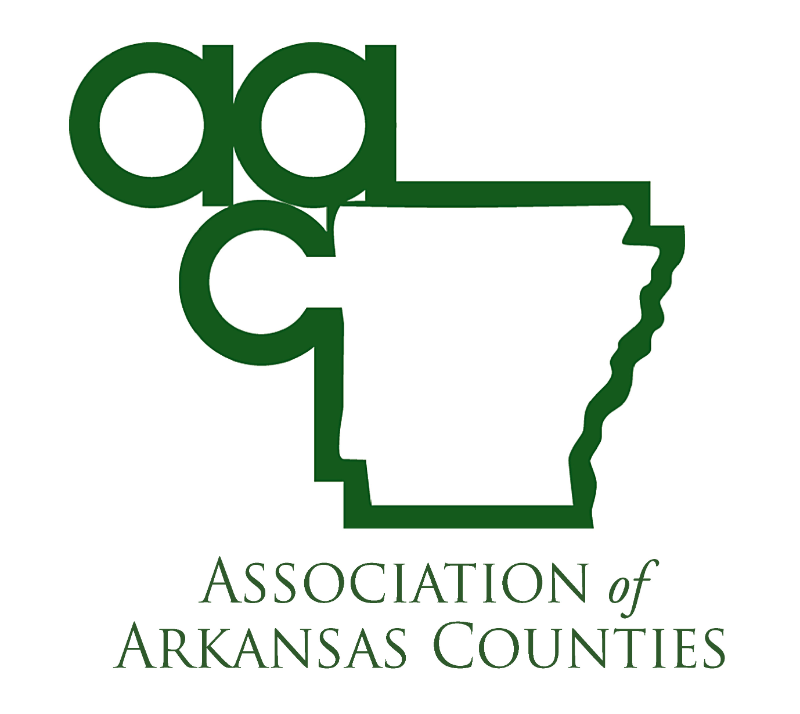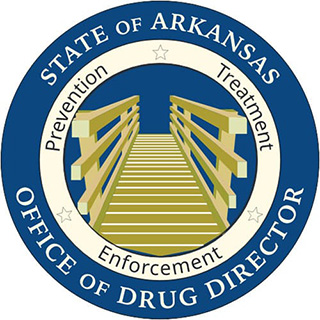New peer-to-peer recovery community center offers assistance
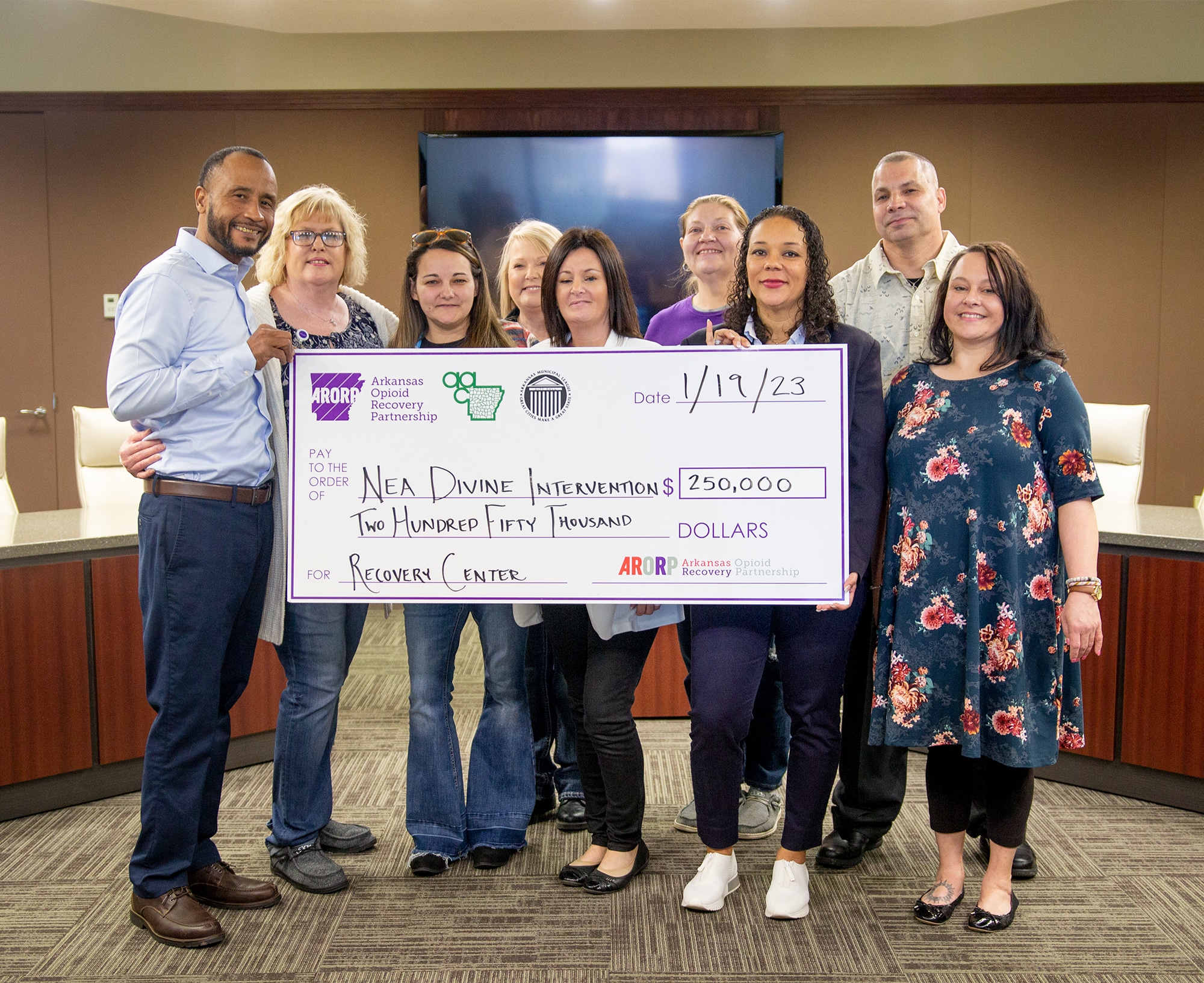
Published by the Jonesboro Sun | See article here.
JONESBORO — Sometimes it is easier to talk to someone with shared experiences, especially for someone who is in recovery. This is the concept behind peer-to-peer recovery groups like the new NEA Divine Intervention Community Center in Jonesboro.
The center is the brainchild of Shalinda Woolbright, who is the owner and executive director of NEA Divine Intervention, which is a rehabilitation house for women, and the new community center, which opened Jan. 9 to everyone.
As of Feb. 20, Woolbright has been clean for 17 years herself and said she knows the importance of peer support. In 2021 she bought a house which holds up to seven women in recovery in order to provide sober living and give them the opportunity to have support within a residential community.
The peer support center offers all different types of recovery services for those suffering with mental illness, substance abuse, and intellectual disabilities, in addition to the residential program for adult women in recovery.
“Addiction is a disease that hurts everyone,” Woolbright said.
According to Woolbright, Divine Intervention is a 501c3 nonprofit recovery community dedicated to providing peer services men and women need to achieve and maintain long term sobriety.
“We strive to meet each person where they are in their recovery, way of life, emotional stability and health,” Woolbright said, noting that they provide a non-judgmental safe zone for everyone in the community.
Now she works along side other peer support specialists at NEA Divine Intervention, all of whom have stories of their own, such as Cassie Cooper, advanced peer support specialist; Wayne Wooten, core peer support specialist; and Bonnie Baker, Jessica Stricklin and Tally Roberts, peer support specialists.
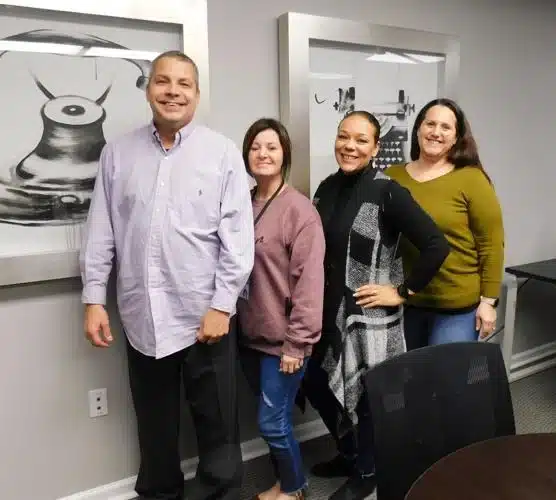
Cooper said she has been sober for six years, while Wooten stated that he has been clean for four years. Baker is also at four years, and Stricklin is at 20 months of sobriety.
Cooper said their staff is very passionate about helping others in recovery.
“Everyone that works here has struggled,” she said. “We have no counselors, so it is all peer-to-peer.”
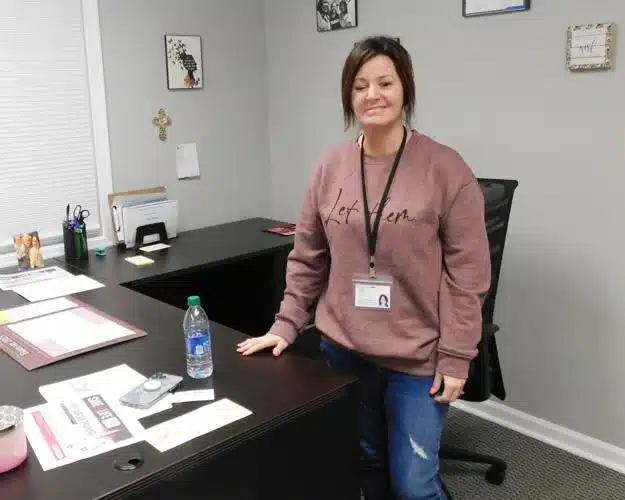
Although they do not claim to be counselors, the staff knows that recovery is a process as they have been through it.
She said they provide help with applying for medical insurance, finding employment, rent help and local transportation.
Cooper also noted that Divine Intervention also focuses on addressing common issues in recovery such as self-esteem, codependency, substance use disorder, co-occurring disorders, reunification with children and families, education, legal issues and other potential needs.
Woolbright then gave an example as she recalled their first client, who was fresh out of prison.
Having been in jail or prison at some point in their own lives, she said they knew the struggles the client was facing and being a felon can make the struggle harder as its even harder to find basic needs such as a job and a place to live.
So, they worked hard to not only find their client gainful employment, but also a rent house and even assisted with the rent.
“We’re building bridges to help people get outside the box and into a safe place where they don’t feel judged or stigmatized,” Woolbright said.
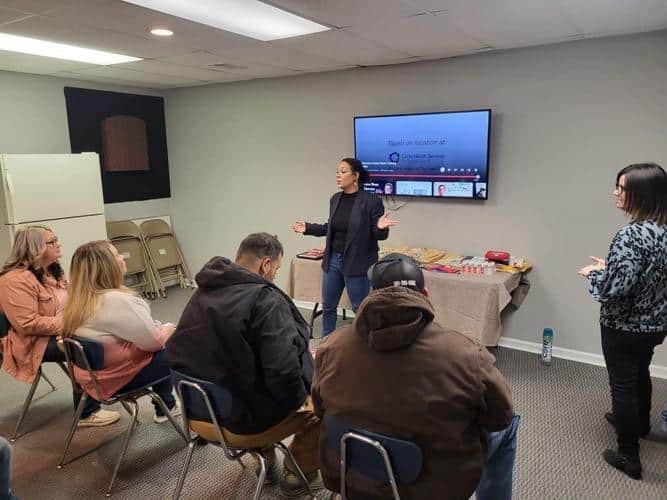
Cooper also stated that, since they opened the new facility, they have served 286 clients, as well as held several free events.
“We do free events every month. In fact, we will do whatever events that God lays on our hearts,” she said, noting an event to help the homeless, which was Wednesday, and free Narcan training coming up on March 3.
“When I was homeless, I just needed someone to listen to me,” Cooper said, noting that they want to meet the homeless on ground level.
“A personal relationship helps more then anything, not prison,” she continued.
Back to the bridges, Cooper noted how important it was to repair families and reunite parents with their children, which was another hardship they all shared through their pasts.
She said they wanted to not only help counsel, but to also help in parenting, which is why they are partnered with agencies such as the DHS (Department of Human Services), the ACC (Arkansas Community Corrections) and the Arkansas Drug Court.
“We want to help parents in the beginning with resources and support,” she said.
“It’s never to late to be a parent,” Cooper added.
Right now they provide two support groups in Jonesboro and hope to add more. They also refer individuals to Al-Anon and other support groups.
The center also provides services such as Narcan training, individual and peer group check-ins, transportation, housing support and harm reduction.
Wooten said that the Narcan training is very important as many drugs are now laced with fentanyl.
“They are even finding it in gummies and vapes,” he added.
According to the National Institutes of Health website, fentanyl is a powerful synthetic opioid analgesic that is similar to morphine, but is 50 to 100 times more potent, and although fentanyl is prescribed for pain, it is also made illegally.
Illegal fentanyl is often mixed with other drugs, such as cocaine, heroin, methamphetamine, and MDMA, which makes it especially dangerous because people are often unaware that fentanyl has been added.
Wooten said that they are also finding an increase in Carfentanil, which is a another synthetic opioid that is approximately 100 times more potent than fentanyl and 10,000 times more potent than morphine.
In fact, Arkansas is fourth in the United States’ opioid epidemic, he stated, noting that the Narcan training helps people to identify drug use and can play an important role in saving lives.
“Today 256 to 270 people will die of a drug overdose,” he stated, noting that sadly the numbers are even higher between Thanksgiving and Christmas.
Wooten, who does prison ministry as well, said they would eventually like to create a program specifically for those coming out of prison and help with their progress as well.
“The system is broken and we become a product of our environment,” he said, noting that is why the staff is there to support others no matter what.
Although they do not push faith-based recovery on anyone, they do believe that faith can help.
Wooten said that we don’t realize how our walk with Jesus affects others, to which Cooper agreed, adding that there are many pathways not everyone is a believer, so they may need a different way.
“Keep yourselves in the love of God, looking for the mercy of our Lord Jesus Christ unto eternal life. And of some have compassion, making a difference; and others save with fear, pulling them out of the fire; hating even the garment spotted by the flesh, Jude 21-23,” she quoted.
Woolbright, who has been helping others and doing peer-to-peer counseling since she got clean over 17 years ago, said simply, “It’s a God thing.”
However it is up to the client on the path they wish to take as Divine Interventions staff supports multiple pathways to recovery from state programs to outpatient to faith-based recovery.
“Sometimes we just need someone to listen,” Cooper said. “Everyone needs something different as everyone deals with different traumas.”
She added that trauma has a really big role in a relapse.
“We all go through trauma and we go through secondary trauma,” she said. “That is why self-care is so important and the more word we can get out, the more we can help those who need it.”
“The hardest thing is to ask for help because your pride stands in the way, because we are all posers,” she said.
She said that people need to understand that sobriety isn’t an easy process because when a person becomes a physical addict, they get physically sick if they don’t have the drugs.
“The problem is education,” she stated. “If you don’t understand, how can you help.”
She also noted that their advocacy is so important as well.
“They need to see that we don’t just walk the walk and talk the talk.” Woolbright said. “We will meet you were you are, no matter where you are.”
“A new environment can give you a second chance and a hope for change and we provide the resources to provide that.” she said.
She always advises individuals to stay connected to their support group, such as their recovery community and their sponsor.
“We watch the people and help in their successes because that’s what keep’s us going.” she said.
She said they also train others to become peer-counselors as well.
Once a person is two years clean, Woolbright said they can join the peer-movement.
“It’s amazing. We are all so passionate about what we do,” she said. “A clean, professional environment can bring on a new mindset and we want to show people that they can have this too.”
For more information about NEA Divine Intervention or the new NEA Divine Intervention Community Center, contact them by email at nea divineintervention@gmail.com, call 870-206-8406, visit their website at https://neadivineintervention.org/ or stop in at the community center at 2408 Phillips Dr., Suite B, in Jonesboro.
